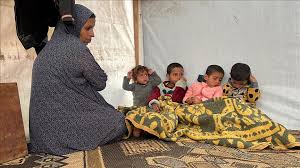Healthcare System Collapsing Amid Blockades and Shortages; Child Pneumonia Deaths Surge
KURRAM: The harsh winter has worsened the already dire humanitarian situation in Kurram, a tribal district in Pakistan’s Khyber Pakhtunkhwa province. Healthcare in the area is collapsing due to blockades and severe shortages of medical supplies. These conditions have led to a dramatic rise in pneumonia cases among children, exacerbating the crisis.
Earlier this month, Syed Ajbar Hussain’s seven-month-old grandson contracted a severe chest infection. Despite rushing the infant to a local hospital in Parachinar, Kurram’s largest town, the family found that the necessary medical care was unavailable. “We couldn’t find the medicines or even the injections we needed anywhere,” Hussain told the media. Without treatment, the infection quickly progressed to pneumonia, and the infant tragically passed away on December 11.
Hussain, mourning the loss of his grandson, lamented the failure of both the federal and provincial governments in providing adequate healthcare to the region. “They have failed us. They have failed to establish their writ,” he said.
Kurram, home to over 600,000 residents and located near the Afghanistan border, has been a long-standing hotspot for sectarian violence. However, tensions have escalated in recent months, with clashes since July resulting in over 200 deaths. In October, the provincial government’s decision to shut down the main highway into the district effectively isolated Kurram, worsening the humanitarian disaster.
Local doctors report that the lack of access to essential medicines has contributed significantly to a rising death toll, particularly among children. According to sources from the Edhi rescue service, 50 children have died so far due to the lack of medical treatment. Thirty-one of these deaths occurred at the DHQ Hospital in Parachinar, while others were reported at smaller local hospitals.
Dr. Hameed, a local physician, described pneumonia as the leading cause of death among children, noting that many children have died from treatable infections due to the lack of medical resources. “We simply don’t have the resources to treat them,” he said. Dr. Shujaat Hussain echoed this frustration, highlighting that even basic medicines like Panadol syrup have been unavailable for months. “We need Panadol to reduce a child’s fever, but it’s nowhere to be found,” he told The News.
Despite these dire conditions, the provincial government maintains that it is providing assistance. In recent weeks, medicines have been sent by helicopter, but many residents and local leaders criticize the aid. Haneef Hussain, president of the local drug association, pointed out that the relief sent, including malaria medication and doctor’s gloves, was inadequate for treating common illnesses like chest infections and pneumonia. “That is useless stuff,” he said.
Philanthropist Faisal Edhi also had to resort to helicopters to deliver relief supplies to Parachinar, as the roads remain closed. He reported severe shortages in hospitals, with child wards in both public and private hospitals having been shut down. “Hospitals are running out of oxygen tanks, fuel, and medicines,” he said. Edhi also emphasized the lack of basic supplies like firewood for heating, making the already brutal winter even more unbearable for residents. “For a population of 400,000, sending one or two helicopters won’t solve the problem. The roads need to be reopened immediately to allow goods and medicines to reach the people,” he urged.
In response to the crisis, authorities have continued to airlift people stranded in Kurram. On Sunday, 27 individuals were transported to Tal via helicopter, with more flights planned. Over 100 people are expected to be airlifted in total. Additionally, the provincial government has sent medicines worth over Rs 60 million through seven helicopter flights to address the acute shortages.
Khyber Pakhtunkhwa’s Chief Minister, Ali Amin Gandapur, acknowledged the challenges faced by Kurram’s residents, vowing to use all available resources to alleviate their suffering. He also promised to take serious steps toward ensuring sustainable peace and resolving the district’s ongoing issues.
Meanwhile, citizens in Parachinar continue their sit-in protests outside the Press Club, demanding the reopening of transport routes. Despite freezing temperatures, protesters have set up tents and vowed to continue their demonstration until the roads are reopened. Protest leaders have highlighted the dire consequences of the road closures, with many shops empty and markets shuttered due to a shortage of food, gas, and essential supplies. “Food stocks have been exhausted, leaving restaurants and tandoors unable to operate,” said social activist Asadullah. He warned that residents are facing the threat of starvation as a result.
As the winter deepens, Kurram’s residents continue to endure unimaginable hardships, with little relief in sight.










